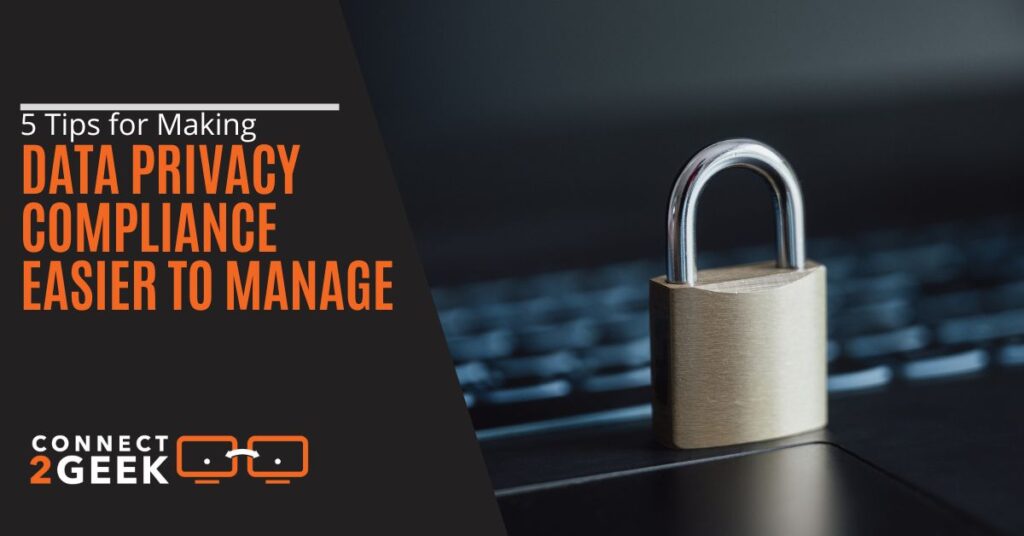
In today’s digital age, data privacy has become a paramount concern for individuals, businesses, and governments alike. With the increasing amount of personal and sensitive information being processed and stored online, ensuring data privacy compliance has become a complex challenge.
Organizations need to navigate through a web of regulations, such as the General Data Protection Regulation (GDPR) and the California Consumer Privacy Act (CCPA), while also upholding customer trust. In this article, we will delve into actionable tips that can help make data privacy compliance easier to manage, allowing businesses to safeguard customer data and build a reputation for responsible data handling.
1. Understanding the Importance of Data Privacy
Maintaining Trust and Reputation
Data breaches and privacy scandals have the potential to irreparably damage a company’s reputation. Consumers are becoming increasingly aware of their data rights, and they are more likely to engage with businesses that prioritize their privacy. By adhering to data privacy regulations and implementing robust data protection measures, companies can establish themselves as trustworthy entities that value customer security.
Legal and Financial Consequences
Non-compliance with data privacy regulations can lead to severe legal and financial repercussions. Fines for violations can be substantial, and legal battles can be time-consuming and costly. It’s crucial for organizations to not only comply with the regulations but also to adopt a proactive approach to data privacy to avoid legal entanglements.
2. Navigating Data Privacy Regulations
Mapping Applicable Regulations
The first step towards easier data privacy compliance is to identify the regulations that are relevant to your business operations. Different regions may have varying laws, and industries might have specific requirements. Creating a comprehensive list of applicable regulations will serve as a guide for your compliance efforts.
Appointing a Data Protection Officer
Many data privacy regulations, such as GDPR, require organizations to appoint a Data Protection Officer (DPO). The DPO is responsible for overseeing data protection strategy and ensuring compliance with relevant laws. Having a dedicated individual or team in charge of data privacy can streamline compliance efforts and ensure that all necessary steps are taken.
Regular Training and Awareness
Data privacy compliance isn’t a one-time task; it’s an ongoing process. Regular training sessions and awareness programs for employees can ensure that everyone in the organization understands the importance of data privacy and their role in maintaining it. Training can cover topics such as handling sensitive data, recognizing phishing attempts, and responding to data breaches.
3. Implementing Technical and Organizational Measures
Data Encryption
Encrypting sensitive data both at rest and during transmission is a fundamental aspect of data protection. Encryption converts data into a code that can only be deciphered with the appropriate encryption key. Even if a breach occurs, encrypted data is significantly more difficult for unauthorized individuals to exploit.
Access Control
Limiting access to sensitive information to only those employees who require it for their roles can significantly reduce the risk of unauthorized data exposure. Implementing role-based access control ensures that employees can only access the data necessary for their job functions. This minimizes the chances of accidental or intentional data mishandling.
Data Retention Policies
Clear and well-defined data retention policies are essential for maintaining compliance. Organizations should determine how long different types of data need to be retained and when it should be securely disposed of. By adhering to these policies, companies can avoid the pitfalls of over-retention and potential privacy violations.
4. Transparency and Communication
Privacy Policies
A comprehensive and easily understandable privacy policy is a cornerstone of data privacy compliance. This policy should outline what data is collected, how it is used, who it is shared with, and the rights that individuals have over their data. Regularly updating and communicating the privacy policy to users fosters transparency and demonstrates a commitment to data privacy.
Consent Management
Obtaining explicit and informed consent from individuals before collecting their data is a crucial aspect of data privacy compliance. Implementing a robust consent management system allows individuals to have control over their data and ensures that businesses only use data for purposes the individual has agreed to.
5. Continuous Monitoring and Improvement
Regular Audits and Assessments
Conducting regular audits and assessments of your data privacy practices helps identify potential vulnerabilities and areas of non-compliance. These audits can uncover gaps in processes and provide opportunities for improvement before they become significant issues.
Staying Updated
Data privacy regulations are constantly evolving, and new laws may be enacted. It’s essential to stay updated with the latest developments in data privacy and make necessary adjustments to your compliance strategies accordingly.
Protect Yourself Today
Safeguarding data privacy is not only a legal requirement but also a moral obligation for businesses that handle sensitive information. By understanding the importance of data privacy, navigating regulations, implementing technical measures, communicating transparently, and continuously improving, organizations can make data privacy compliance more manageable.
Prioritizing data privacy not only protects customers but also enhances a company’s reputation and minimizes legal risks. As we at Connect2Geek believe, the path to successful data privacy compliance is an ongoing journey that requires dedication, vigilance, and a commitment to putting customers’ privacy first.
For more information on how we can assist you in your data privacy compliance journey, please feel free to contact us.
